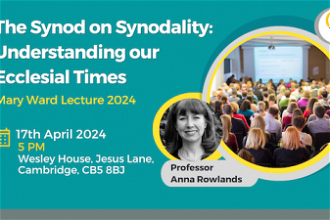Newcastle: homily at Mass for victims of tsunami
The following homily was given by Fr Michael Campion at a Solemn Requiem Mass on Sunday at St Mary's Cathedral, Newcastle upon Tyne. Here in Newcastle, we stand in solidarity this weekend with all those who are suffering from the Indian Ocean earthquake disaster. In this Mass we are remembering them and asking God to help them rebuild their shattered lives. We also are asking God to help us and others to do all we can to help them. I ask you to contribute as generously as you can to the collection at this Mass as all our collections this weekend will be donated to the Disaster Emergency Appeal. At such a time as this we have to ask the question: how does a loving God allow a giant wave in the Indian Ocean to inflict such suffering, injury, devastation and death on so many innocent people? Why does a loving God allow bad things to happen to good people? This is the "question of questions" all Christian believers are having to struggle with once more as the world looks on with horror at what has happened in Indonesia. Earthquakes and tidal waves wreaking disaster and terror are nothing new to humanity. They have been known to earliest civilisations and are even documented in the Bible. But the sheer terror and awfulness of what has happened in the Indian Ocean is new to us - certainly, I have never seen anything like it in my lifetime and older people say the same. Perhaps - in terms of the unleashing of massive and terrifying power - the bombing of Hiroshima may come close. However, far greater numbers of people have died in the past week than from the explosion of a nuclear bomb and the tsunami's destruction covers a far greater geographical area than a city in Japan. Here in Europe, on 1 November 1755, over 60,000 people were killed in Lisbon, Portugal, following giant waves after an earthquake had destroyed much of the city. Just as we are asking today, people then wondered how God had allowed this to happen and various religious explanations were offered. Four years later, in 1759, the French philosopher Voltaire wrote his famous book 'Candide' in which he savagely satirised some of these beliefs and explanations. The butt of his criticism was those who held that the earthquake was an expression of God's anger at the people of Lisbon's sinful ways. Were all those destroyed sinful people? Why were the innocent killed as well? That belief is similar to one some people hold about AIDS today i.e. this disease is God's way of punishing sexually irresponsible people. But what of those millions of innocent children who have inherited the disease from their parents? Or those who contracted the disease through a blood transfusion? Such thinking is morally unacceptable as it blames innocent victims for their fate. Voltaire's 'Candide' also attacked the idea that God is both All Good and All Powerful and, therefore, that the world He created must be perfect. This 'belief' is hilariously mocked through one of the main characters in the book called Dr Pangloss. Pangloss is a wrong-headed optimist who is completely unfamiliar with the ways of the world. His philosophy is that "all is for the best in this best of all possible worlds". He clings to this and keeps repeating it even in the face of some of the most appalling injustice, suffering and disaster one could ever encounter. Voltaire's satire highlights what is a dilemma for Christians of all eras. If God is All Powerful, then how can He be All Good [when He did not do anything to prevent these people suffering]? If God is All Good, then how can He be All Powerful [when He obviously failed to stop the earthquake]? To our human way of thinking, God cannot be All Good AND All Powerful... So where do we go from here? The Book of Job in the Bible is dedicated to this question of why innocent people suffer, why bad things happen to good people. Throughout the Book, Job refuses to accept the traditional explanation that people suffer because they have sinned. In his case - he has been reduced from wealth and good fortune to poverty, loss of family and great misfortune - he knows he has done nothing wrong to incur God's anger and thus bring upon himself such suffering. In the book, he ends up challenging God repeatedly to offer a worthwhile explanation for the bad things that have happened to him and to other good people. From chapter 38 onwards, Job gets his 'answer' in a series of 'speeches' from God. The answer he gets is: there is no answer. In so many words God says to him: "Who the hell do you think you are, challenging me, the Author of Creation, to give you - you puny little mite - an explanation for how I control creation." In one passage (Job 38:8-11) now very relevant where this Indonesian disaster is concerned, God says to Job: Who pent up the sea behind closed doors when it leapt tumultuous out of the womb when I wrapped it in a robe of mist and made black clouds its swaddling bands; when I marked the bounds it was not to cross and made it fast with a bolted gate? Come thus far, I said, and no farther: here your proud waves shall break. The tsunami has shown once more - perhaps for the first time for some of us - that there is a power greater than our human species and that nature - brute, raw, terrifying nature - holds us in its hands. We might be able to deal with some of the consequences of its power but we are not in control. Nature, not humankind, is still the real master. This latest tsunami has demonstrated once more this ancient truth with devastating force. And we can do no more than look on in awe and in horror and count our blessings. Christians, however, are invited to do something more - as Job and, later, Jesus himself came to learn, we are asked to trust ... to trust in God's ways [however cruel they appear], to trust in the goodness of God, especially when we are at our most vulnerable and nothing seems to make sense. For those who still believe in God THE question is not "Why did this happen?" but "Lord, what do you want us to do now that this has happened?" People in mosques, synagogues, temples and churches are gathering all over the world this weekend in response to that question. Here in Newcastle we are praying with them for the injured and the bereaved; and with them we are donating money in record amounts to help the relief agencies. We are standing in solidarity with all those affected by this disaster and giving practical expression to the belief that "It is better to light one candle than to curse the darkness." In an excellent article in yesterday's Times newspaper, the Chief Rabbi, Dr Jonathan Sacks, ended with this prayer and I share it with you now: God, I do not know why this terrifying disaster has happened but I do know what you want of us: to help the afflicted, comfort the bereaved, send healing to the injured and aid to those who have lost their livelihoods and homes. Accordingly, I invite you now to contribute as generously as you can to the collection about to be taken for the Disaster Emergency Appeal. The collections at all our Masses this weekend will be given to this Appeal.


















